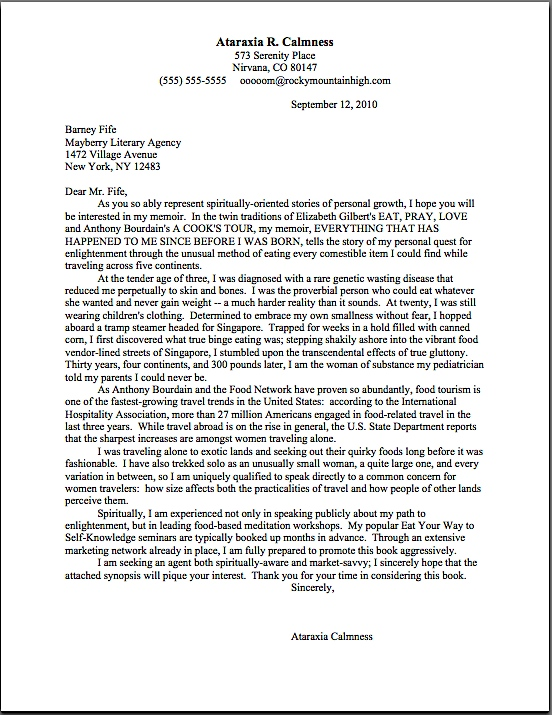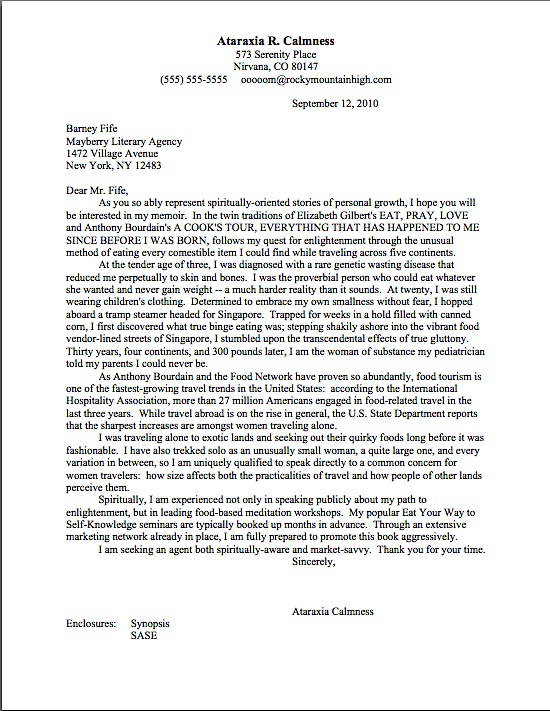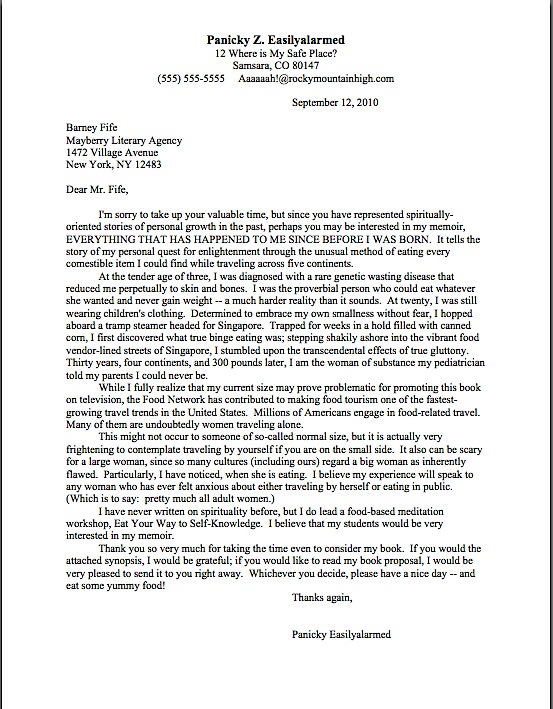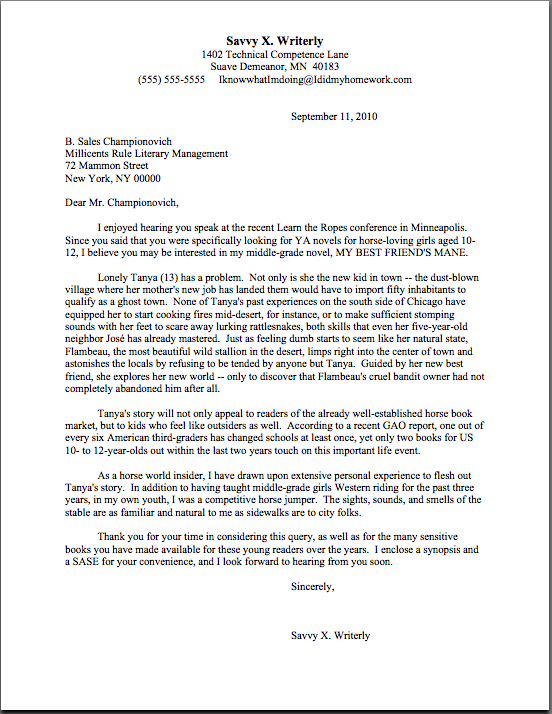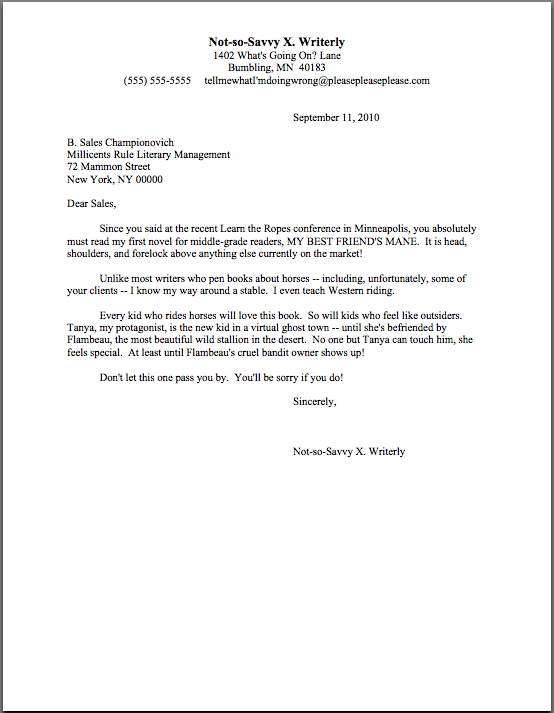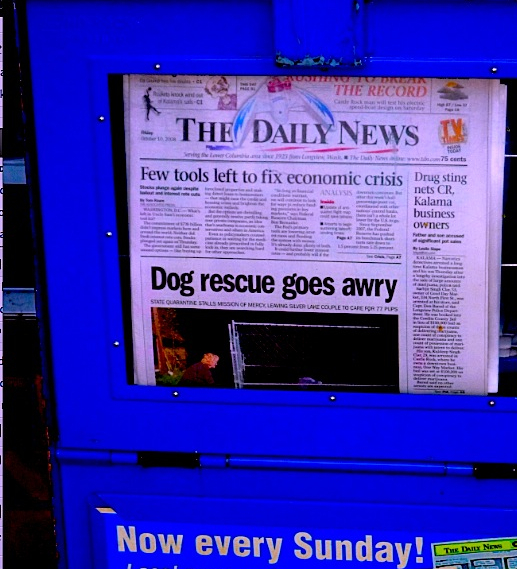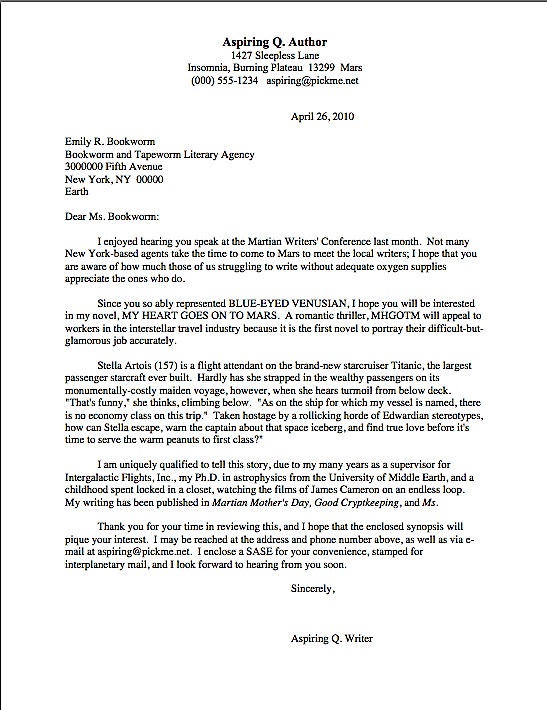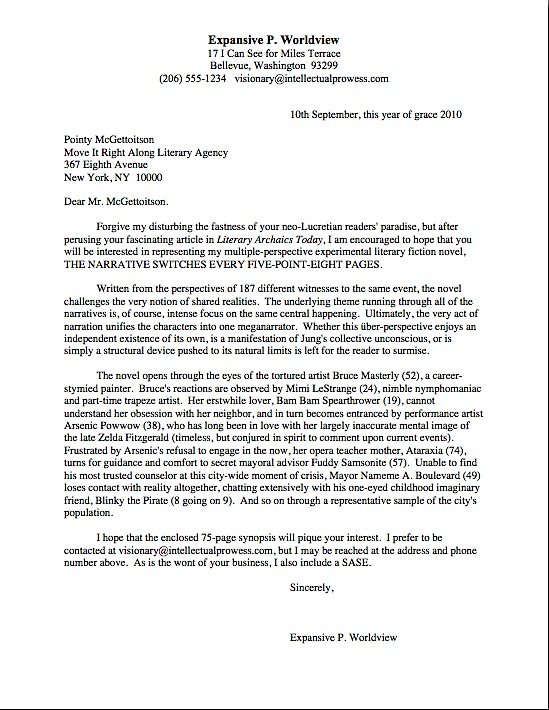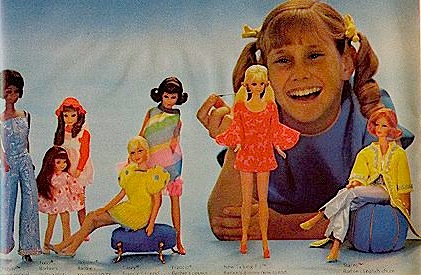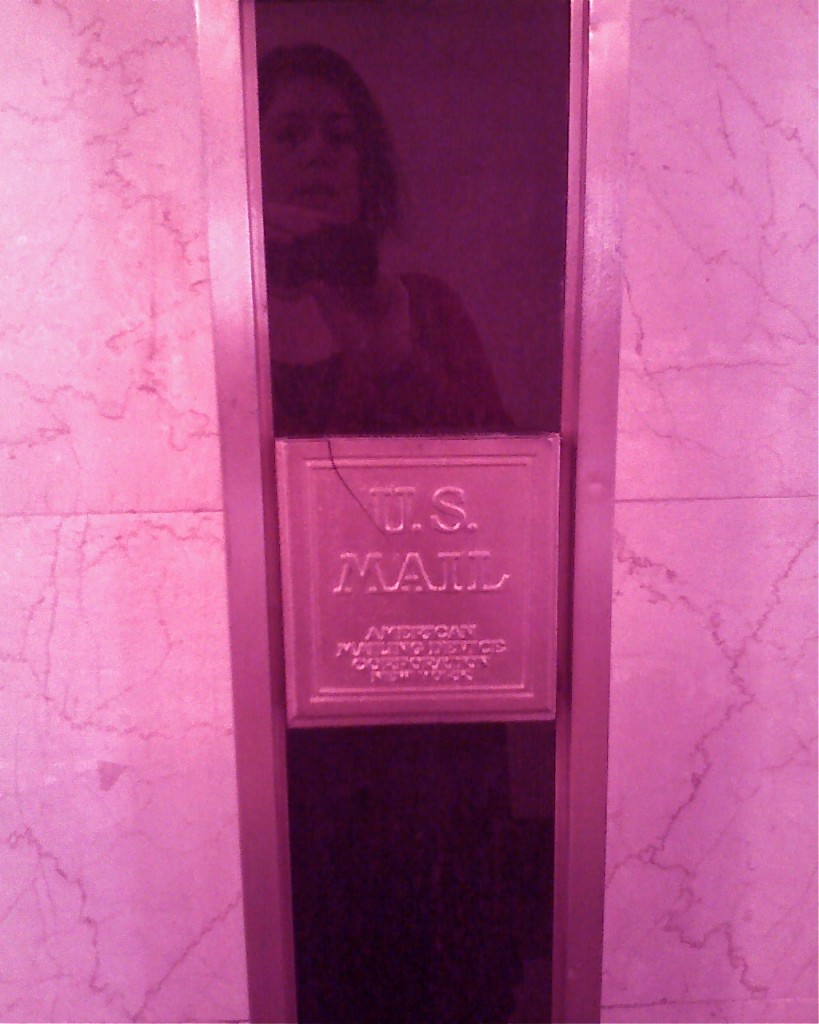Again, that was a longer gap between posts than I intended — I imagine that some of you intrepid souls are becoming just a trifle impatient to pop those query letters into the mail — but such is the life of a red-pen-for-hire. I go where I am needed, when I am needed. And my, how often the relatively tiny minority of developmental editors with experience in walking a writer through last-minute revision requests seem to be needed lately.
That’s good for those of us who enjoy riding into Dodge, guns blazing, to tame a wild revision crisis, of course, but it can be awfully nerve-racking for the poor writers. Although multiple (and often extensive) substantive revisions after signing a book contract — or, increasingly common, after one’s agent has shopped one’s manuscript around for a while — have been the norm for quite a while now, most first-time authors walk into representation and book contracts with no idea that their books will need to be tweaked further. Once a submission makes it past Millicent the agency screener and is embraced by her boss, the agent of your dreams, all the writer has to do is sit back, relax, and let the book-marketing professionals take over, right?
Um, wrong. Despite most agents’ expecting manuscripts to be completely clean by submission time (i.e., free of typos, grammatical errors, misspellings, and formatting problems), it’s actually rather rare that an agent won’t ask at first-time client for some market-oriented revisions. And it’s downright normal for an acquiring editor to issue an editorial memo either before or after acquisition, laying out a framework for modifying the manuscript with which she has fallen in love.
All of that is expected, at least by those who have been skulking around in publishing circles for a while. What’s changed recently is the frequency with which manuscripts under contract get passed from hand to hand these days. I don’t mean to frighten you this close to Halloween, but you wouldn’t believe how many authors wake up after celebrating a book sale (particularly a first book sale) to find that the acquiring editor is no longer associated with the project, due to layoffs, moves to other publishing houses, early retirements, the editor’s having decided to transmogrify into an agent, or what have you. Regardless of the reason a manuscript is reassigned, one constant tends to crop up: what the new editor wants to see in the book is typically different from what the acquiring editor did.
Very good, those of you who just clutched your chests and appealed to the Almighty: your extrapolation was correct. In practice, this increased mobility means that writers — again, more often those publishing a book for the first time, but it does happen to the tentatively established, too — frequently are faced with the daunting prospect of having to revise a manuscript that has already been revised in accordance with an agent’s expectations a second time for the acquiring editor, often on a rather short deadline. Not entirely surprisingly, this can lead to a writer’s feeling that her original vision has been slowly consumed over several meals by a ravenous lion.
Is this better than how first-time authors felt in the past, when agents or editors asked for a single, immense revision, a process often described as the book’s having been swallowed whole by a boa constrictor? That’s a matter of personal taste, naturally. There’s a reason that the demand for the services of the aforementioned pen-swinging editorial crisis brigade has risen sharply since the publishing industry’s contraction: who’s a writer going to call for help at a time like this?
Hey, it’s a living. For those of us who like jumping in and solving seemingly intractable editorial challenges, especially if we happen to find the rarefied and often moan-filled air of a deadline-pressed revision environment exhilarating, there’s never been a better time to be a freelance editor.
While you’re already lying, moaning, on the nearest fainting couch, I might as well explain why: it’s not all that unusual anymore for editor #2 to give way to a third. Or a fourth. Heck, I even know a few hapless authors struggling through a transition to a fifth editor. I’ve said it before, and I shall doubtless say it again: editors, like agents, are not possessed of a single mind; they harbor individual literary tastes.
Remember that, please, as we continue to talk about the vicissitudes of querying. It’s the key to understanding why generic queries simply don’t work.
If you’re the kind of aspiring writer who finds that last sentiment outrageous, troubling the air with your bootless cries of, “What do you mean, I need to personalize a query for every agent I approach? That’s absurd. Agents are all looking for the same thing: a marketable book. Therefore, all I should need to do is present my manuscript as marketable, and any agent worth his proverbial salt should automatically sit up and take notice,” well, you’re certainly not alone. First time queriers who don’t think that are as rare as people whose second toes are longer than their big toes: certainly not unheard-of — check out any ancient Greek statue, or the Statue of Liberty, for that matter — but definitely in the minority.
In response to what the statistically-minded amongst you just wondered: somewhere between 10% and 20% of the population. And if you also thought, “Gee, if I had a protagonist whose foot was in the genetic minority, I could use that statistic in my query letter,” congratulations: you’ve been paying attention to our ongoing discussion of how to impress Millicent with the size of your potential target market.
While we’re on the subject of target audience and how to talk about it in your query letter, I’d like to take a brief break from our list of common querying faux pas to address some murmurings I’ve been hearing out there in the ether. I shall be talking more about identifying your ideal reader later in Queryfest, of course, but if possible, I’d like to set some worried minds to rest on the challenge, or even the necessity, of identifying in your query who is likely to want to read your book.
Come on, admit it: as a writer, you probably find this question rather intimidating, if not downright appalling, don’t you? “Isn’t it my future publisher’s job to figure out how to market my book?” I’ve heard some of you grumbling, and with some good reason. “Wasn’t it my job to write it, or if it’s nonfiction, to write a book proposal for it? Isn’t alerting an agent to that fact the end of my marketing efforts? Agents, after all, are skilled at pitching books like mine to editors; wouldn’t it be presumptuous for me to tell them how to do it? By the same token, don’t publishers’ marketing departments possess far more intimate knowledge of who is buying what kind of book than I, an isolated writer with no access to sales statistics, could possibly be?”
My, you ask a lot of rhetorical questions, grumblers, but in answer to the central question here, no, a writer’s marketing tasks do not begin and end with landing an agent. There was a time when that was at least partially the case, but for years now, authors — again, especially first-time authors — have been expected to be active participants in book marketing. It’s not uncommon, for instance, for authors to have to set up their own book signings and readings, or even to pay for their own transportation to same. While some publishing houses still spring for website development for their new authors, many simply tell the author to establish a web presence on her own. It’s not even all that unusual for authors to hire their own publicists, on the grounds that their publisher’s publicity departments tend to be so overworked.
So in practice, thinking now about your ideal reader, what s/he is already reading, and why s/he will want to buy your book is smart strategy. That doesn’t mean, though, that it’s not going to be a bit difficult, or that you’re not going to be tempted to follow one of the many, many query templates floating around the Internet that simply leaves that information out. It’s not technically required, after all: as long as you mention the book category and describe your book well, Millicent doesn’t actually need that information in order to assess whether your book will fit into her boss’ current list.
So if you want to omit it, that’s certainly your right. As your longtime friend and writing advisor, however, I feel that it is my duty to point out that including it has been known to make the difference between her saying, “Oh, yes, there is a well-established target market for this book,” and her muttering regretfully, “This book sounds interesting, and I might personally want to read it based upon this description, but I just don’t think there are enough readers out there for it.”
Or, to put it another way: before you read that statistic about how many people have Greek statue-style feet, wouldn’t you have assumed that it was too small a demographic to be worth naming as a target readership?
So would Millicent. But do the math: as of today, the current U.S. population is 312,431,252. (Thank you, Mr. Internet!) Taking the most conservative estimate of statue foot incidence, the writer with the foot-obsessed protagonist could justifiably assert in his query that about 31 million Americans could identify with second-toe lengthiness.
Before any of you rushes out to compose a novel about such a foot-waver simply in order to use this rather impressive statistic in its query, let me hasten to add that the mere fact of being able to say that something in your book might conceivably resonate with some large group of people isn’t necessarily going to help make your case with Millicent.
This, for instance, would be a rather unconvincing query. As always, if you are having trouble reading it, try holding down the COMMAND key and pressing + to enlarge the image.
Okay, why doesn’t this work? In the first place, did you catch that Whiskers addressed Ms. Bookmongerson as Mr.? “Hmm,” Millicent would muse, reaching for the stack of photocopied form-letter rejections that is never far from her elbow, “I wonder what male agent got the query just before this on Whisker’s list.”
Also, did you notice that the descriptive paragraph began with HERE, BOY! follows…, a lead-in right up there with My book is about… on the Millicent-annoying scoreboard? Obviously, a novel will follow its protagonist; equally obviously, a book description will tell what the book is about. So why waste precious page space — or Millicent’s patience — by stating the self-evident?
But we were talking about target audience, were we not? The biggest problem here is that the statistic-based claim is far too inflated to be plausible: Millicent knows that not every dog lover will buy this book — or, indeed, any book. It’s not only demonstrably untrue, but absurd at first glance: no book is universally appealing to everyone in its target demographic.
That’s a shame, really, because the statistic itself is rather eye-catching. If Whiskers had taken the time to make a solid case that some of those 182 million people are likely to pick up the book for a specific reason, it might have been successful. That argument could have been as simple as while there are many novels about cat owners, dog owners seldom see their day-to-day trials and joys represented on the fiction page or as complicated as a point-by-point comparison with the selling points of MARLEY & ME, as long as it was plausible. As the query stands, though, it just reads as though Whiskers listened to some darned fool of a writing guru who insisted that statistics make the query.
But as we may see, how one presents those statistics is as important as the numbers — using them as page decoration, rather than the basis of a solid case for your book’s appeal, might well cost your query dearly. Why? Well, inflated readership claims are a notorious agents’ pet peeve. So If Millie has been screening queries for a while, she might automatically stop reading at the sight of such a preposterous assertion.
Yes, really. Is that the sound of your knees rattling together in terror, those of you who have sent out queries with similar claims, or has the cosmos suddenly been overrun with maracas players?
Also, Whiskers is just assuming that dog ownership necessarily translates into wanting to read about dogs. Yet plenty of dog owners never give the printed page a passing glance, just as many inveterate book-buyers cross the street when they see a dog sauntering down the sidewalk toward them. As the social science types say, coexistence does not necessarily equal correlation — and definitely doesn’t equal causation.
I know, I know: hardly a day goes by without your hearing that old chestnut, right?
Okay, so maybe it’s not all that widely-known an aphorism, but it’s nevertheless true: just because two things happen to occur at the same time or in similar places doesn’t mean that the two are related, or even that the two things could always be found together. For instance, many people own dogs; many people buy books about dogs. But does the mere presence of a dog in a household mean that the people living there will automatically buy a book about a dog?
Of course not: dog owners are not the only purchasers of books about dogs, by a long shot. Think about dog lovers with pet allergies, for instance, or relatives of dog owners who have no idea what to get them for Christmas. Together, these two groups represent millions of people, all of whom would have been left out of an assessment of target market based upon the relatively easy to disprove assertion that dog owners — and, by implication, only dog owners — have already demonstrated an interest in books like this, and therefore may be relied upon to consider buying HERE, BOY!
Does that large gasp that just ricocheted around the cosmos indicate that at least some of you had not realized that this was the purpose of talking about target market at all? Just in case that’s been stymieing some of your efforts to discuss your book in the language of the industry, I’m going to go ahead and restate it as an aphorism: just telling Millicent in your query that your book is going to sell to a particular group of people is not the same thing as specifying a target audience for your work. Identifying the people who already read books like yours and showing why they will want to read it is the key to convincing Millicent and her boss, the agent of your dreams, that your book has market appeal.
In other words, when the publishing industry talks about demographics, what they have in mind is not just big groups of people, but big groups of people already in the habit of buying particular kinds of books.
Starting to make sense that form-letter rejections so frequently include some permutation of the phrase I just don’t think I can sell this in this literary market, isn’t it? It’s not necessarily that the manuscripts being queried could not possibly garner any readers at all; Millicent simply cannot tell from the overwhelming majority of queries what already-established readership is likely to find the books being presented appealing enough to pick them off the shelf.
It makes intuitive sense, really, when you consider how book sales actually work. Unless publishing types anticipate a book’s being a bestseller (a relative rarity, by definition), why would they care about the tastes of the non-book-buying public? While it is true that occasionally, a book will be so wildly popular that even people who seldom buy books will purchase it — not a bad definition of a blockbuster, actually — the runaway success of books like THE DA VINCI CODE, HARRY POTTER, and BRIDGET JONES’ DIARY generally come as something of a surprise to the publishing industry precisely because their lure extends beyond their respective book categories’ usual audiences.
What does that mean for you and your query, you ask? Well, for starters, claiming that your book is the next DA VINCI CODE is, alas, unlikely to win you Brownie points with Millicent unless you offer plausible reasons that your story will grab the same readers. Without such argumentative support, you run the risk of her dismissing it as just another market-ignorant exaggeration from a writer who believes, as so many queriers seem to do, that the literary market consists only of bestsellers. Believe me, anyone who works in a reputable agency will be painfully aware how rare bestsellers are, particularly ones by first-time authors.
Instead of going for the big claim, think smaller. Millicent is aware that the overwhelming majority of book sales are not category-crossing blockbusters, but favorite authors’ work within specific book categories. It’s better querying strategy, then, not to ask only who among the public at large might already be interested in the subject matter of your book, but to look to your chosen book categories’ loyal readership. Is there a subgroup within that audience that has already demonstrated it likes to buy books that share characteristics with yours?
And no, Virginia, I’m not suggesting that you open your query with something as obvious as this:
Really? A mainstream fiction book will appeal to the mainstream fiction audience? Who could possibly have anticipated that? And once again, ol’ Whiskers misidentified the agent’s sex in the salutation.
Oh, you may laugh, but you would be STUNNED at how often queries actually do read like this — or worse. Believe it or not, Millicent’s bloodshot eyes are also frequently confronted with arguments like the following. See if you can spot the subtle logic problem. Or perhaps two.
Where should I even start? On the bright side, Whiskers did manage to address Ms. Bookmongerson correctly in the salutation, but this query has little else to recommend it. The tone is pushy (under the guise of attempted humor, a rather common passive-aggressive technique in queries), the description reads like a romance, not mainstream fiction, and although you and I know that Whiskers actually does have enough professional experience with dogs to legitimize a claim to expertise, those credentials don’t show so much as a whisker here.
All of those weaknesses pale, however, next to that jaw-droppingly irrelevant third paragraph. Just because there are sailor characters doesn’t mean the novel will automatically appeal to everyone who has ever served on the sea, after all. From the descriptive paragraph, how can Millicent tell to what navy the dognappers belonged? For all she knows, they could have been merchant marines, or land-lubbing dog-fanciers cleverly disguised.
Since the logical connection is pretty tenuous, at least from the query-reader’s point of view, it’s not clear why Whiskers brought the navy up at all. And if the book is about dogs, why on earth bring up cats?
Being privy to Whiskers’ behind-the-scenes reasoning — oh, we editorial pen-wielders get around — I can answer that question: she heard somewhere that cat books sold really, really well. She just wanted to jump on that bandwagon.
I can tell her — and you — now that this strategy isn’t going to work. Stick to the target audience for the main subject matter of the book, or at most, the primary subject matter plus a subplot’s worth. Provided, of course, that either of those actually will appeal to the readers you have in mind.
Admittedly, it can be difficult to figure out who those readers might be, even if one is already pretty aware of who is currently buying similar books. As thoughtful and incisive reader Dani observed recently,
I feel that naming a category for your book is a no-brainer. (Finding the category can be a bit more tricky lol) But as far as describing your target audience…this one I’m finding a bit challenging. I’ll have to read your post on that. Is “13-17 year old girls who have lost their parents during war-ridden times and now have to traverse Europe to escape looming doom” too narrow?
I love this question, not only because it nudged me into writing this post (thanks, Dani! And Mr. Internet for bringing us together!), but because although Dani described her target market flippantly, she’s quite right about who is likely to find her book appealing. She’s merely defining her audience too narrowly.
How so? Perhaps jokingly, Dani has assumed that the target reader’s life story would need to be a perfect match with the protagonist’s to claim her as an ideal reader. But what if we take out some of the specifics and broaden our focus a little? What if, in fact, we embraced the proposition that since readers tend to like to read about people like themselves, wouldn’t it make sense that people like your protagonist would be the natural readership for the book?
Let’s try that for a moment: presuming that the ideal reader would fall within the ages Dani specifies, let’s not look beyond girls who are already reading YA. Based upon the description above, what parallels might there be between her experiences and certain portions of the established YA readership?
Constructed that way, it’s much less daunting to think like a publicist for a moment, is it? If you’re having some difficulty starting the brainstorming flow, here’s a hint for you: the young reader I have in mind is unlikely to be traversing Europe, but she might well feel a sense of looming doom. Any guesses?
If you said, “Wait — a lot of young girls have lost parents. I would advise Dani to run, not walk, to find out just how many,” give yourself a gold star for the day. Award yourself two if you also shouted, “And while you’re at it, do a spot of research on how many kids in that age range have had other deaths in the immediate family! Those young readers might really appreciate a novel that reflected some of their reality.”
I can answer that one off the top of my head, as it happens: about a fifth of Americans experience a death within their families before they are old enough to vote. That’s a hefty chunk of the young population, and frankly, I think they could use more thoughtful novels that don’t whitewash what it’s like to lose someone you love at that age. While bereaved adults can cope by making radical changes in their lives in the wake of a loss — moving to another state, changing jobs, taking up sky-diving, dating unwisely, to name but four — young mourners seldom have that luxury. I also think a lot of young readers would be thrilled to see their trauma taken seriously — something adults tend not to do very often, unfortunately; the young bereaved often come under tremendous pressure to pretend that everything is normal at home. So it’s not too much of a stretch to say that, done well, a book like this could be very important to the right reader.
Don’t believe me? Okay, let me ask you: if you knew a young reader going through that kind of devastating loss, what book would you buy for her? Wouldn’t you at least consider a book like Dani’s, one in which a young heroine has to struggle against a similar loss and, if I am reading the description correctly, is able to do something about it?
The target audience portion of the query sort of writes itself now, doesn’t it?
Does the resonant thunk of thousands of jaws hitting the floor out there mean that you weren’t expecting it to be quite so easy? That’s really Dani’s doing: by defining her protagonist’s dilemmas so clearly, she laid the groundwork for some very straightforward brainstorming about audience. (Well done, D!)
That’s a great first step: defining your protagonist in general terms, in ways that are not too difficult to translate into the conditions of your chosen book category’s current readers’ actual lives. Step two: use those parallels to define what subset of readers would most likely be able to identify with those conditions. Step three: show why.
Obviously, this is going to be a significantly harder case to make if your protagonist happens to be a fourteen-eyed purple sloth from the planet Targ than if she’s a hard-working dentist from Milwaukee with a marked propensity toward procrastination, but there’s no need to be hyper-literal here. You’re a writer; be creative. Does your sloth follow a profession with an earth equivalent, perhaps or is the conflict between the sloths and the space monkeys similar to conflicts in a fantasy subgenre? Does Slothie share characteristics with the reader you have in mind — being bullied at Purple Sloth High might be very relatable for readers who were teased in their youths for being different. Anything can work, provided that
(a) Thing X is integral to the story,
(b) Thing X is apparent from the descriptive paragraph how it is integral to the story (a very common omission), and
(c) the query makes it clear how and why Thing X will appeal to a specific subgroup of your chosen book category’s already-established target readership. Of course, that will be quite a bit easier to establish if
(d) Thing X actually does appeal to that particular subgroup’s sensibilities.
Yet even after having gone over this array of strategies for identifying your target audience, some of you are still toying with leaving it out altogether, are you not? I know, I know: it’s tempting to cling to the notion that people — some people, somewhere — will want to read your book simply because you’ve written it, and written it well. While, let’s face it, until you establish a literary name for yourself, few people who do not know you personally will buy a book solely because it has your name on the cover, it’s perfectly understandable to want potential readers to fall in love with your writing.
For that to happen via traditional publishing, however, someone working with an agency and/or publishing house is going to have to fall in love with the book first — and these are people who think in terms of book categories and target readerships. Learning to describe your manuscript in their language does not mean that your writing is any less beautiful; it merely raises the probability that someone with the power to publish your work will read it.
I’m about to back away slowly now, so you may ruminate on that, but before I do, I would like to ask you to compare a couple more pieces of book-promoting writing. First, harken back to this last summer’s series on conference pitching. Remember the magic first hundred words, the speech that would enable you to talk cogently about your work to any total stranger affiliated with the publishing industry?
”Hi, I’m (YOUR NAME), and I write (BOOK CATEGORY). My latest project, (TITLE), is geared toward (TARGET MARKET). See how it grabs you: (KEYNOTE).”
Knowing my deep ambivalence toward one-size-fits-all formulae, I’m sure it will not surprise you to hear that I would expect a savvy writer to tinker with this format a little. If our pal Whiskers, say, were scheduled to make a formal pitch to agent A. H. Bookmongerson, he might open their conversation like so:
”Hi, I’m Whiskers McGee, and I write mainstream fiction. I’d like to talk to you about my novel, HERE, BOY!, a lighthearted romp about dog-training geared toward that portion of the 60 million dog owners in this country who, although they might not admit it aloud, see their dogs as extensions of themselves — and would get a kick out of a story in which dogs and owners go into psychotherapy together.”
Sounds pretty good in this iteration, doesn’t it? Isn’t it a pity that Whiskers couldn’t use that as the opening paragraph of a query?
Wait a minute — why not? After all, the opening of a query should contain quite a bit of the same information, right?
Dear {agent’s name here},
Since you so ably represented (TITLE OF SIMILAR WORK), I hope you will be interested in my (BOOK CATEGORY) book, (TITLE), geared toward (TARGET MARKET).
(BOOK DESCRIPTION)
Seems as though it would work, doesn’t it? Let’s try plugging in specifics to see what happens.
Dear Ms. Bookmongerson,
Since you so ably represented DROOLY DOGS A-GO-GO, I hope you will be interested in my mainstream novel, HERE, BOY! It’s a lighthearted romp about dog-training geared toward that portion of the 60 million dog owners in this country who, although they might not admit it aloud, see their dogs as extensions of themselves — and would get a kick out of a story in which dogs and owners go into psychotherapy together.
Imogene Crowley (31)…
Not bad, is it? Although identifying your target audience might seem like a maddening limitation of your book’s potential appeal or an intimidating demand that you solve all potential marketing difficulties before you’ve landed an agent, much less a publishing contract, at the query stage, it’s really just a matter of introducing yourself and your writing in the terms Millicent will understand. Trust me, saying who you think is likely to find your book appealing will in no way prevent other readers from buying it, any more than suggesting a target demographic now will rule out promoting your book toward different audiences later on.
Think of it, in other words, not as the end of a conversation about marketing your work, but the beginning.
Next time, we shall dive right back into that checklist we’ve got going. In the meantime, keep up the good work!
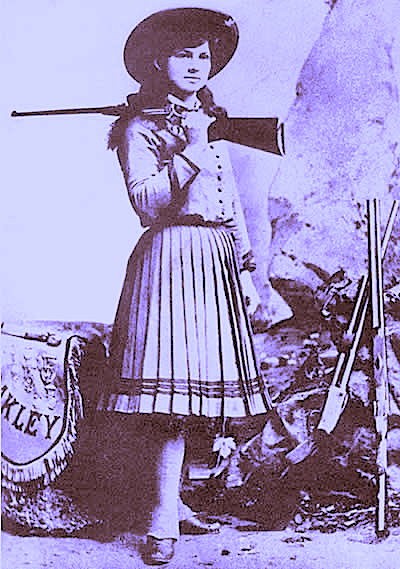
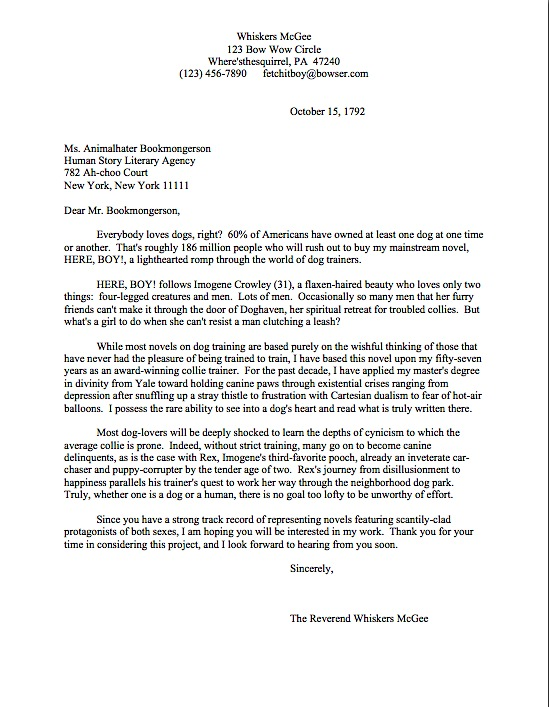
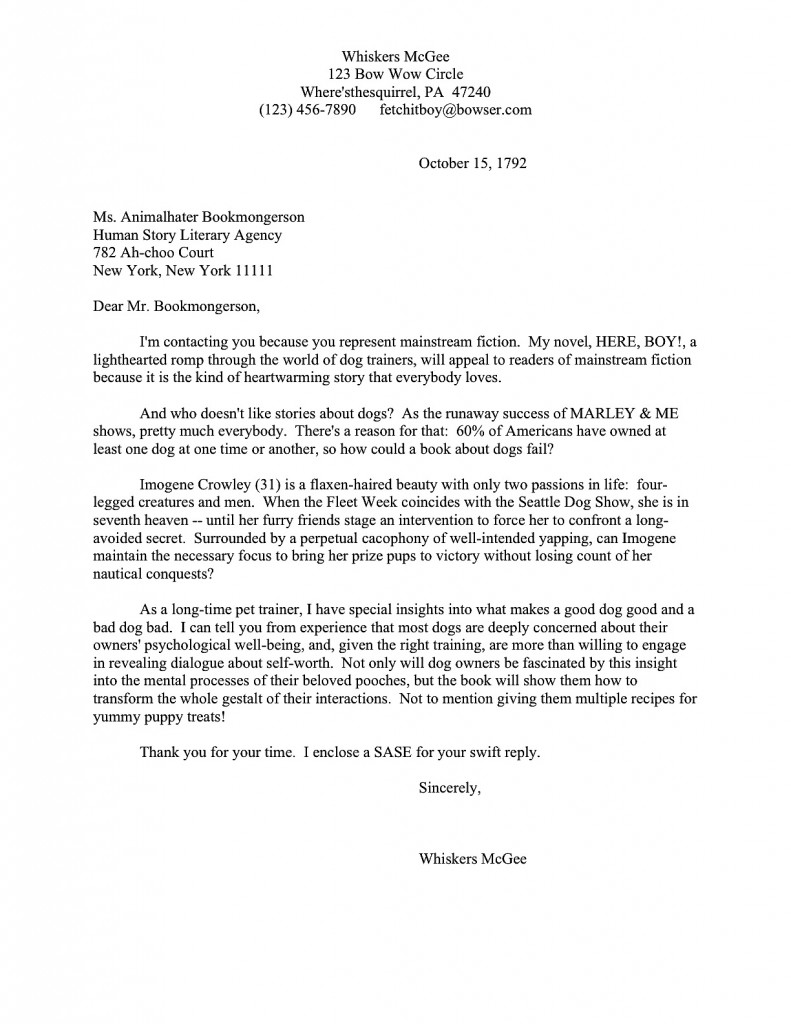
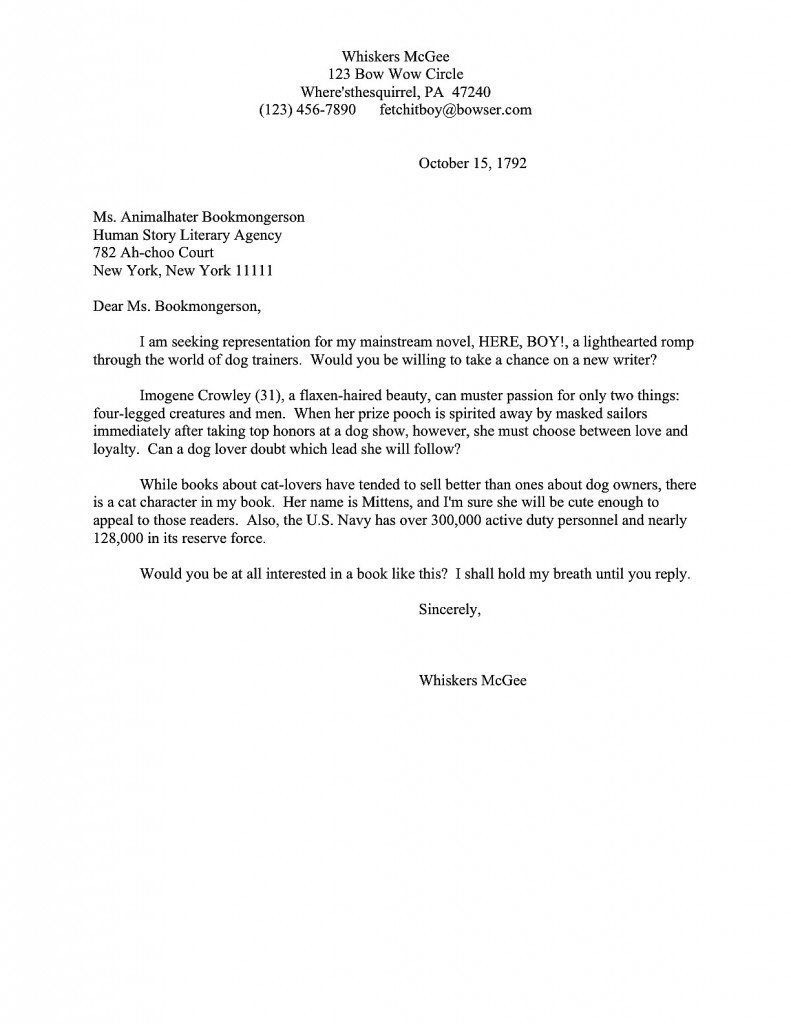

 The vast majority of queries are not read in their entirety before being rejected. Therefore, the first paragraph of your query is one of the very few situations in the writing world where you need to tell, as well as show.
The vast majority of queries are not read in their entirety before being rejected. Therefore, the first paragraph of your query is one of the very few situations in the writing world where you need to tell, as well as show.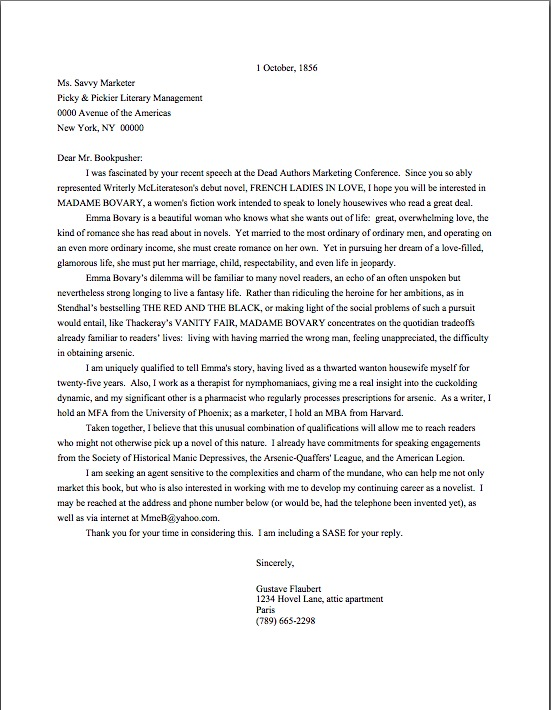
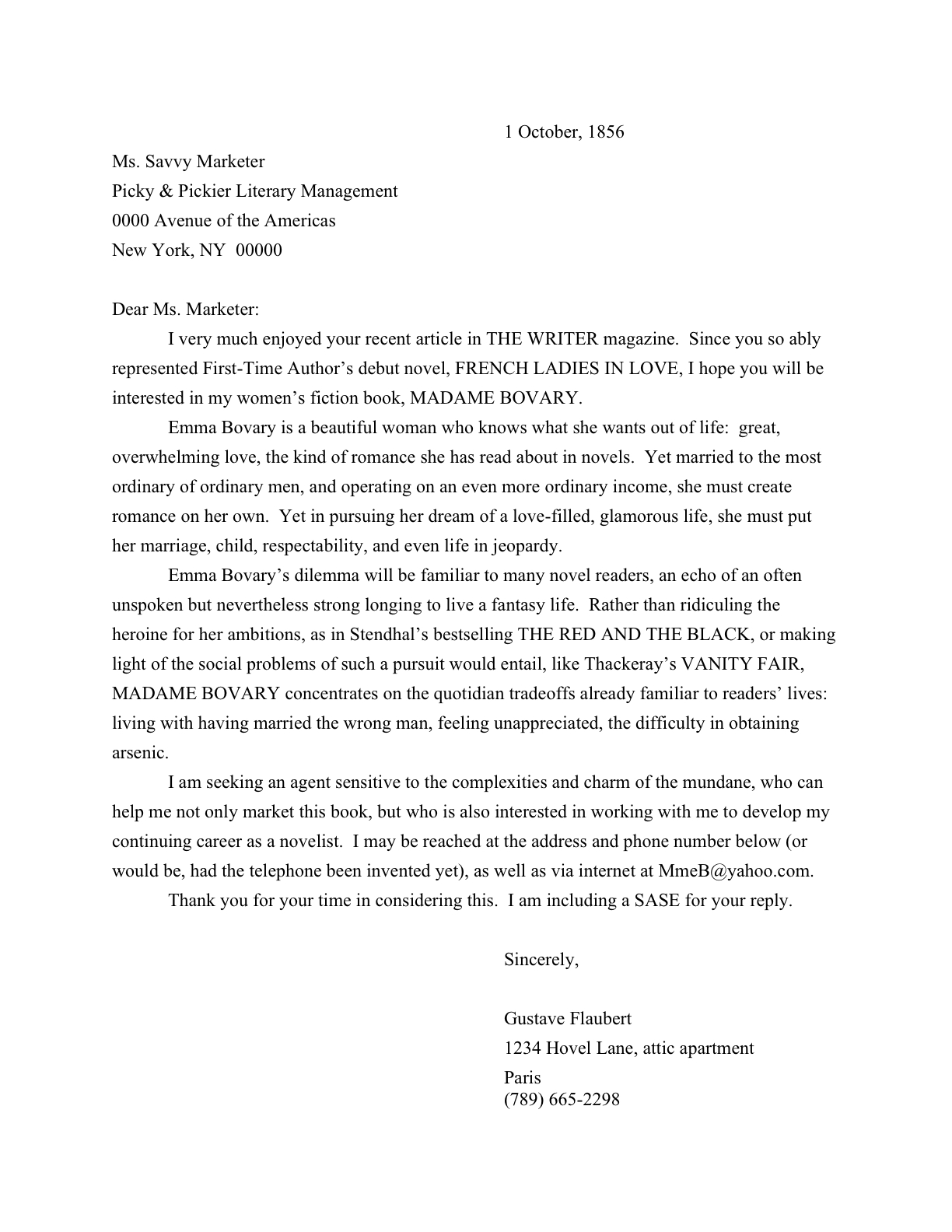

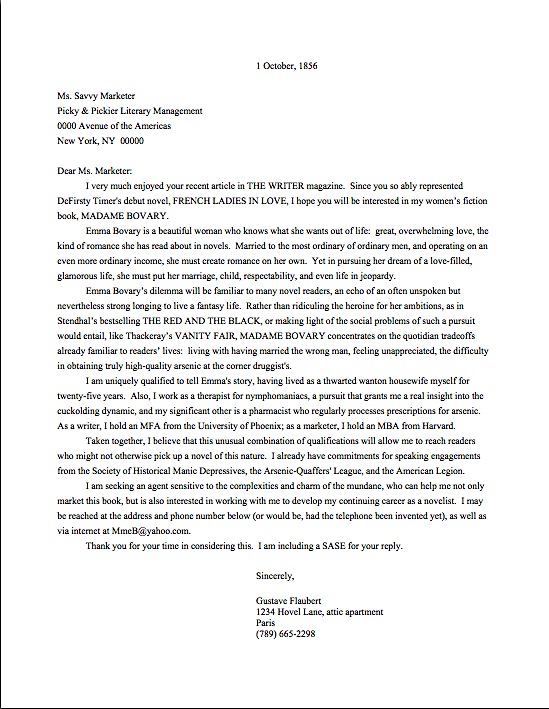
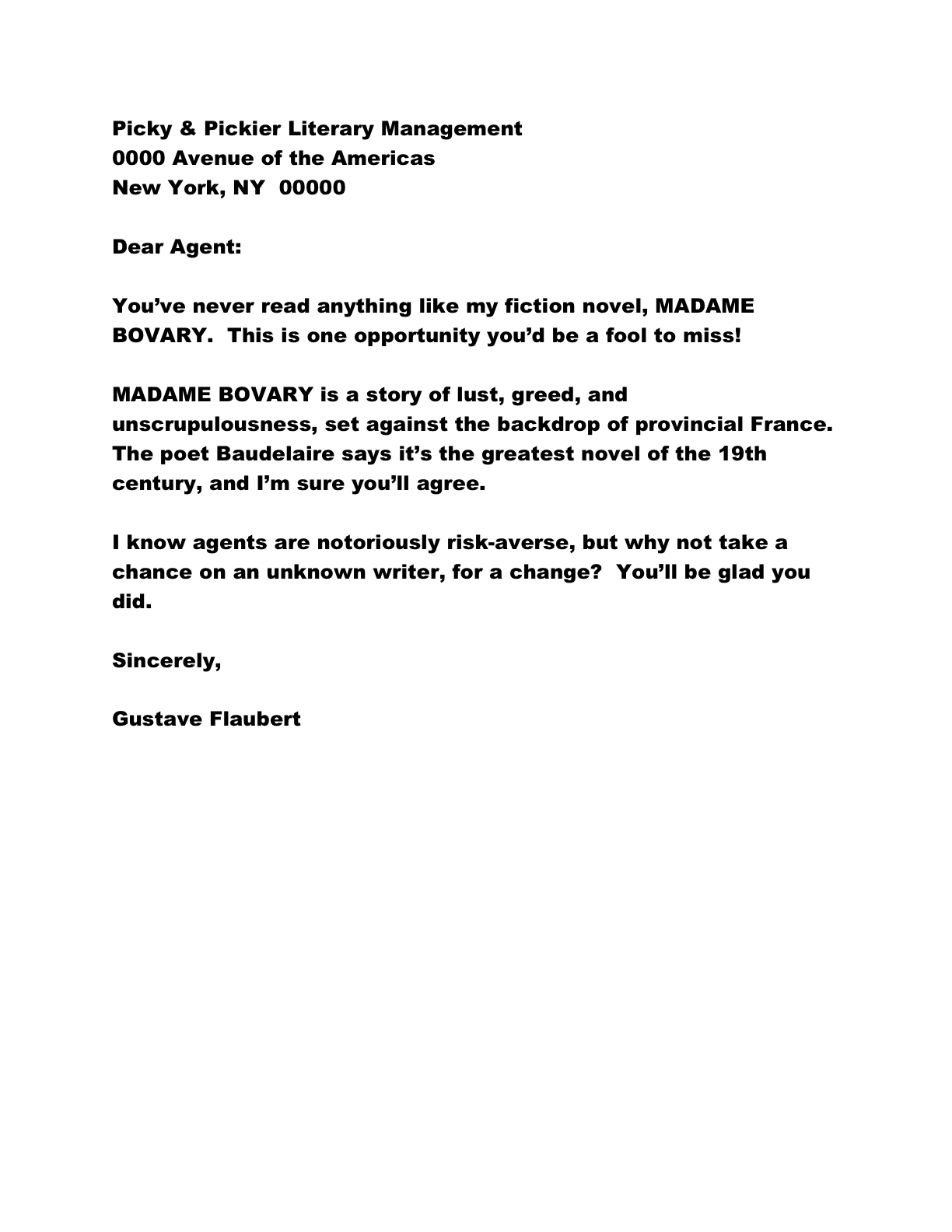
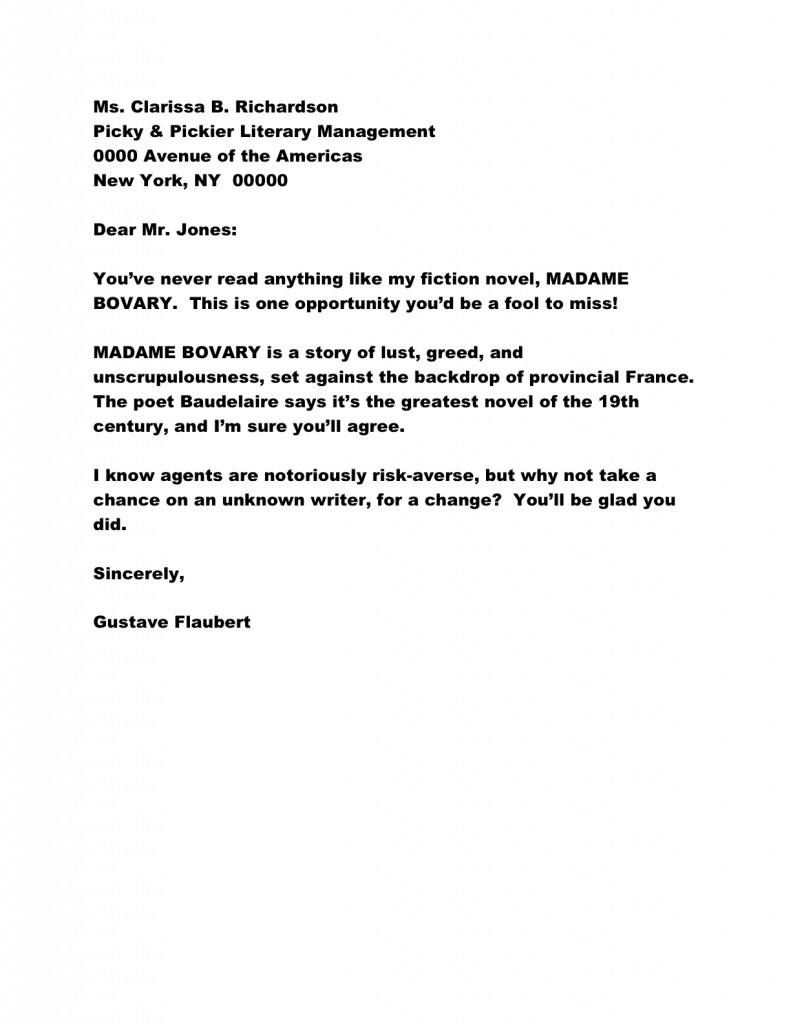
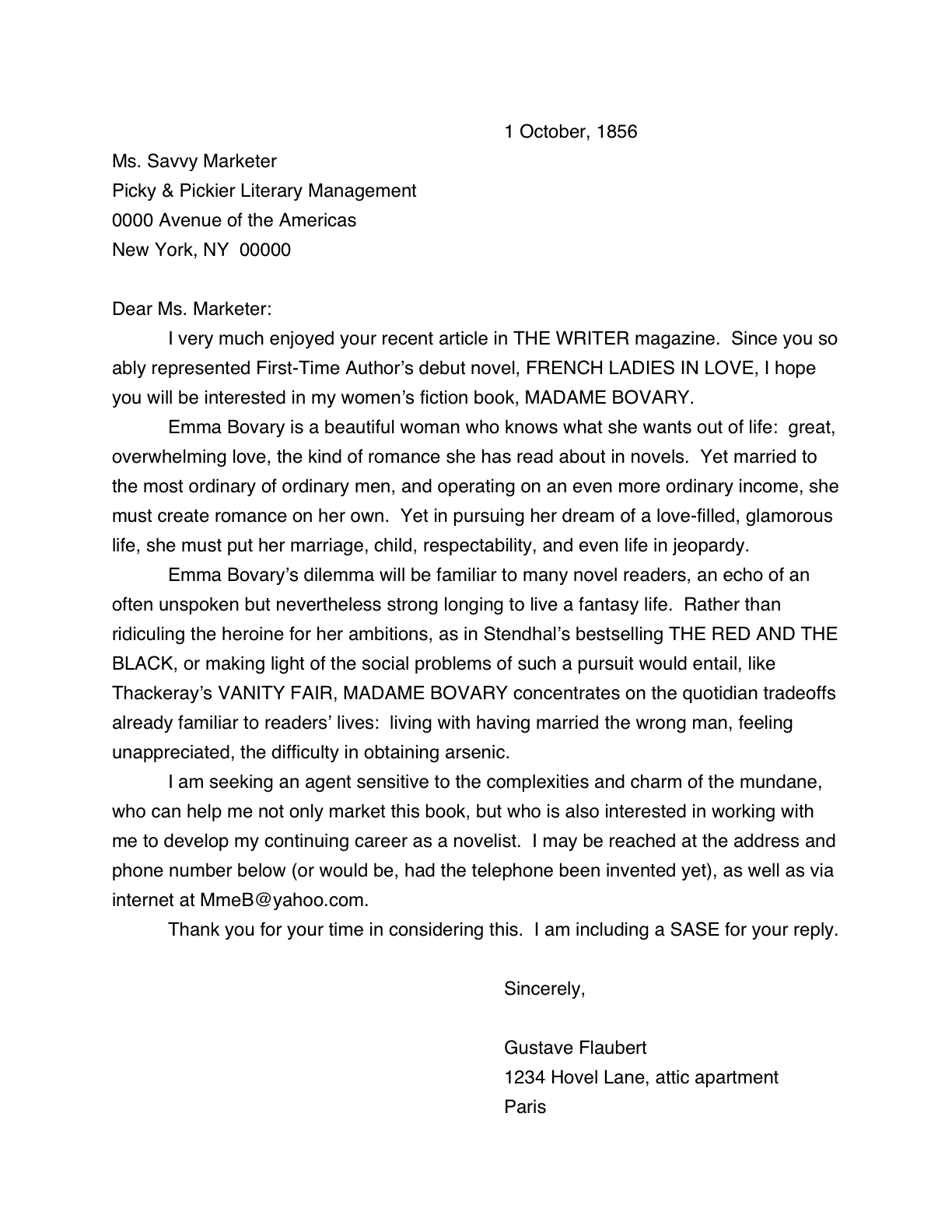
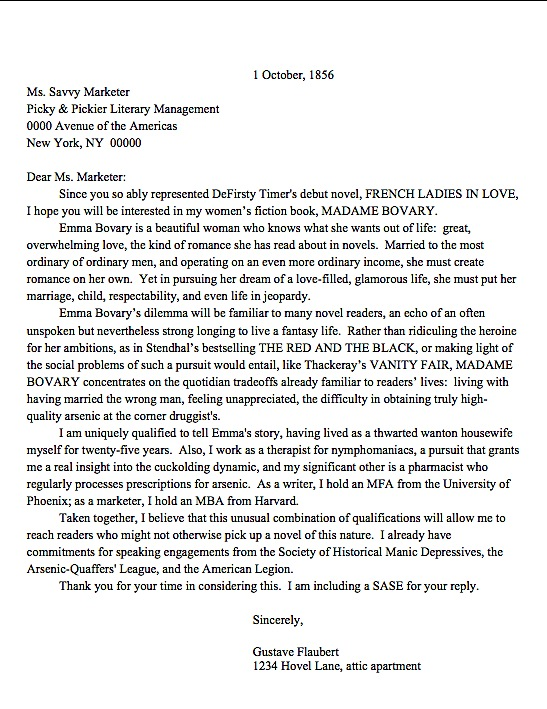
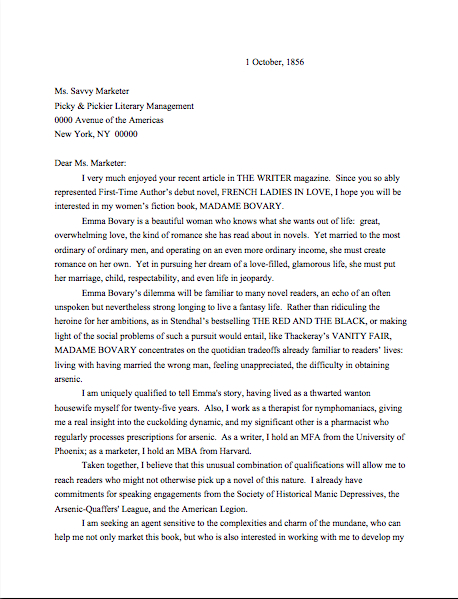

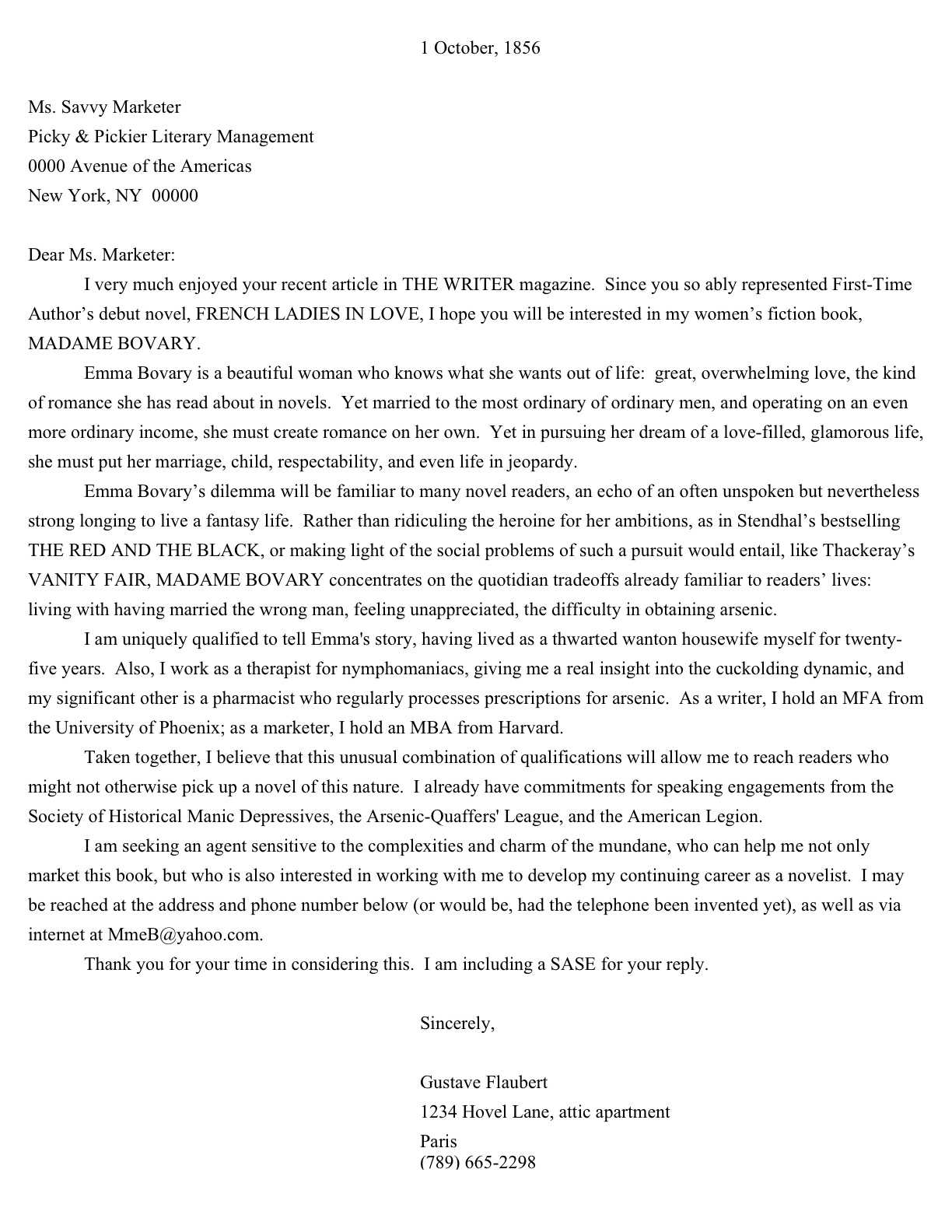
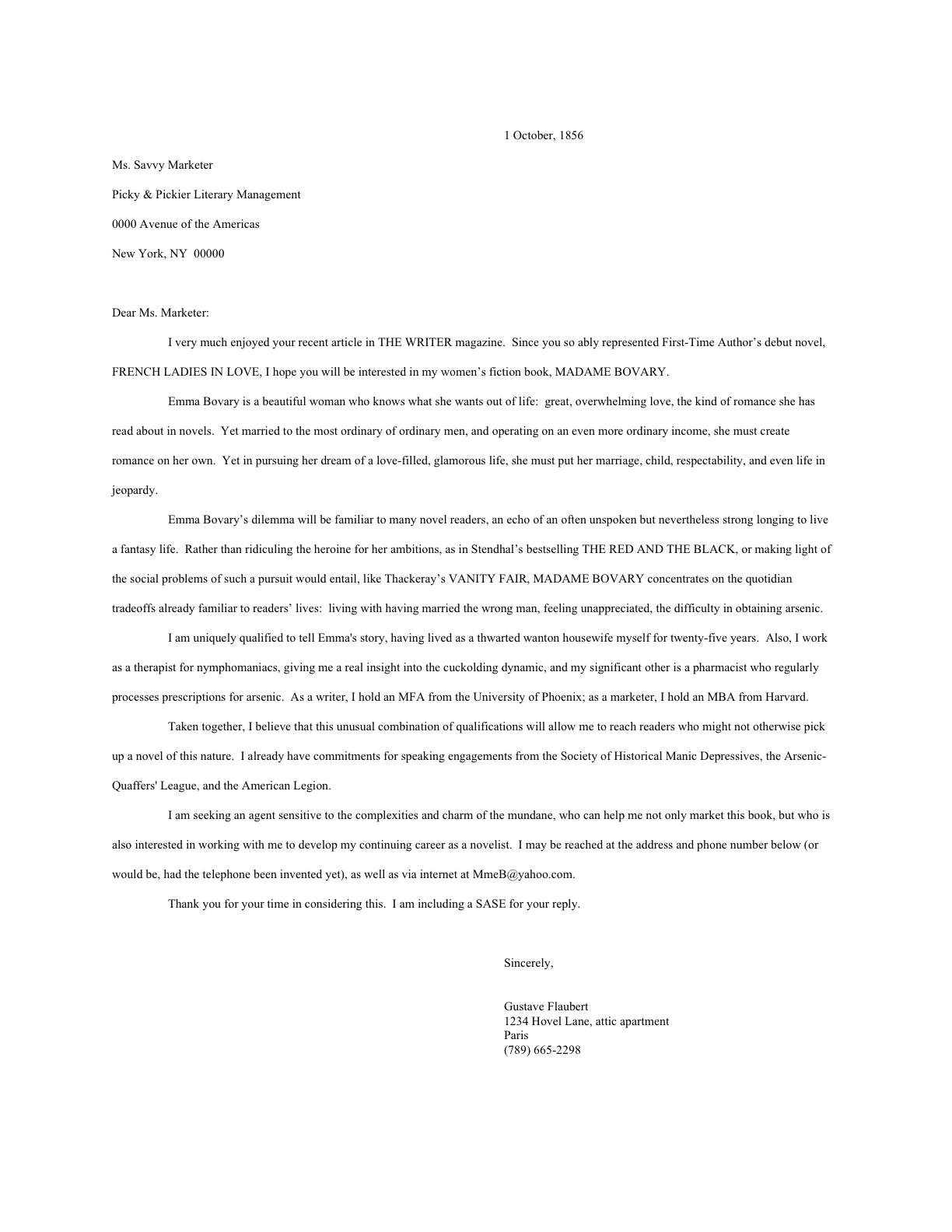
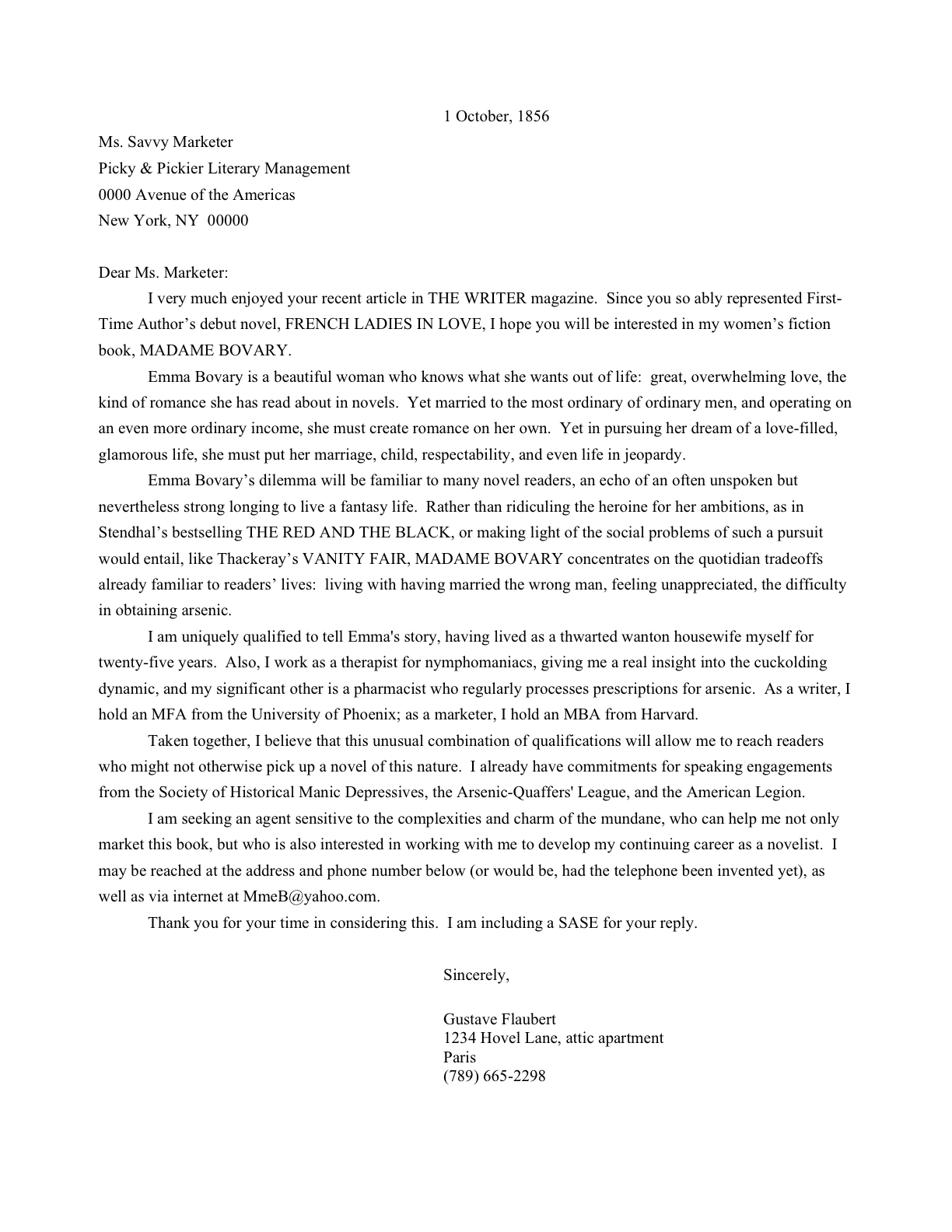


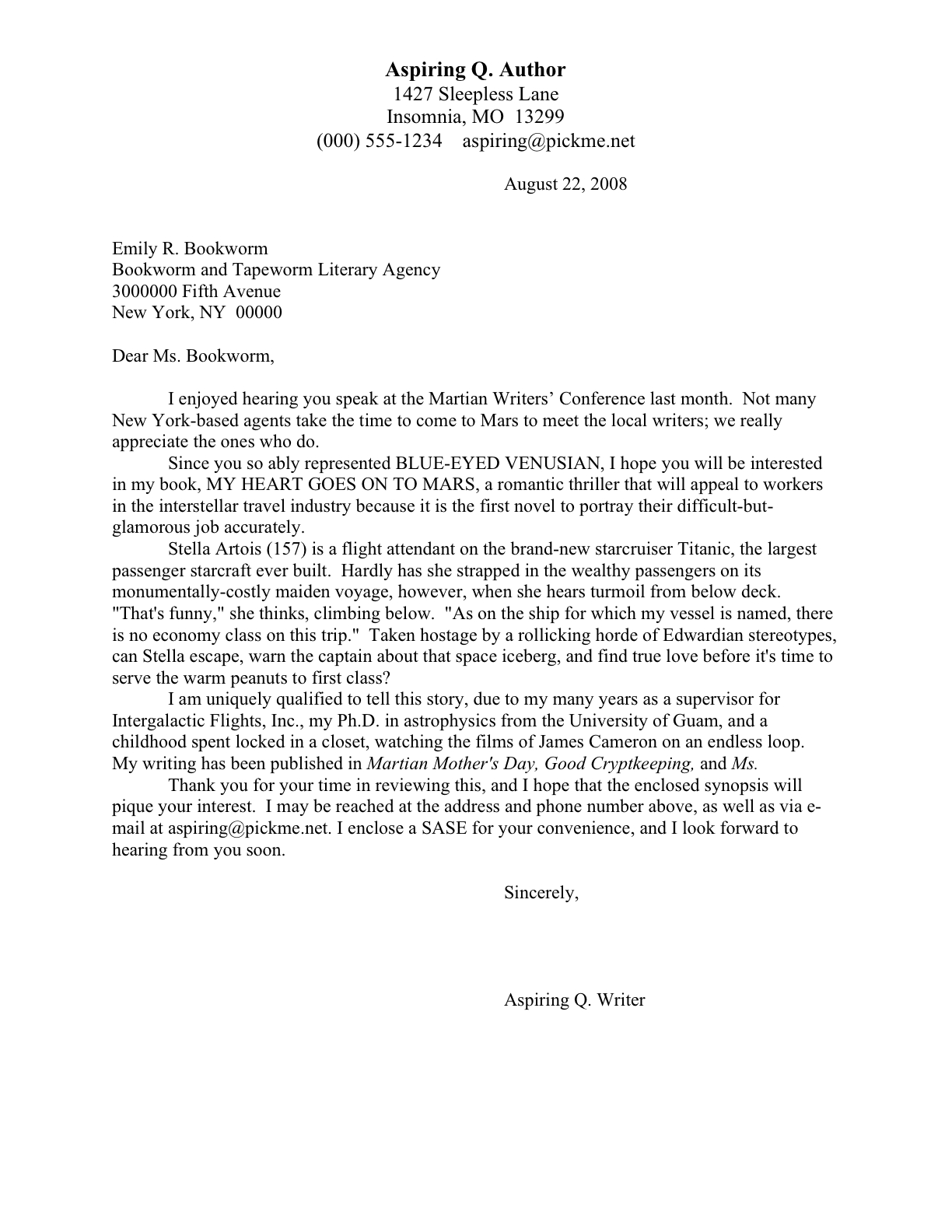


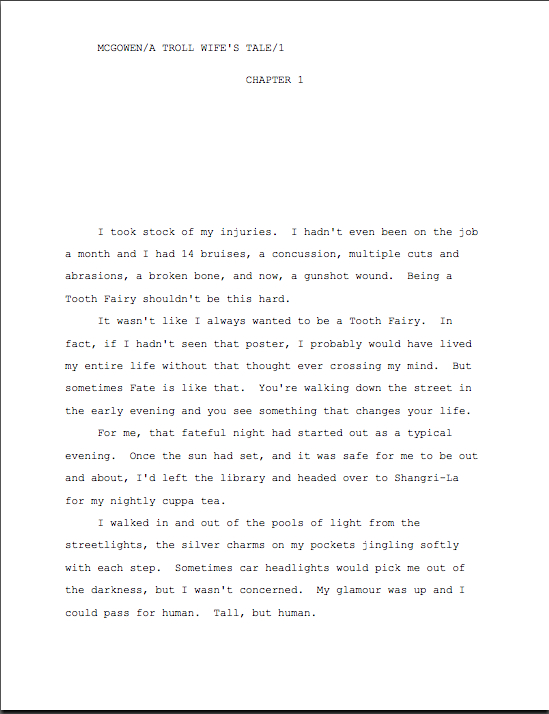
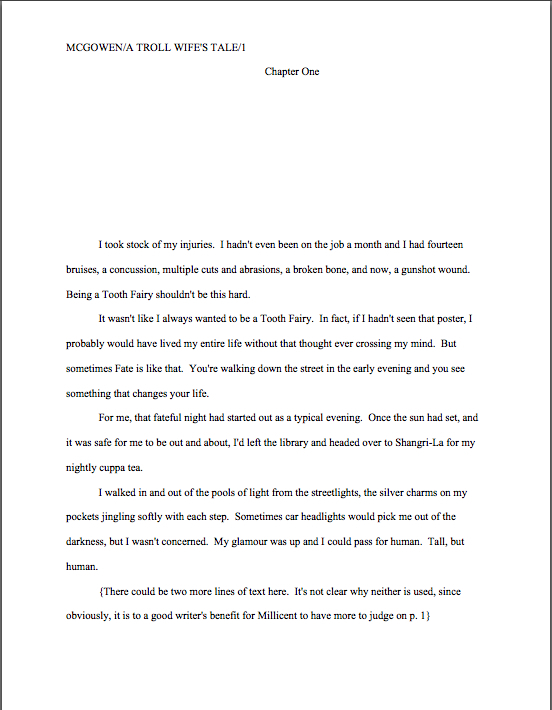
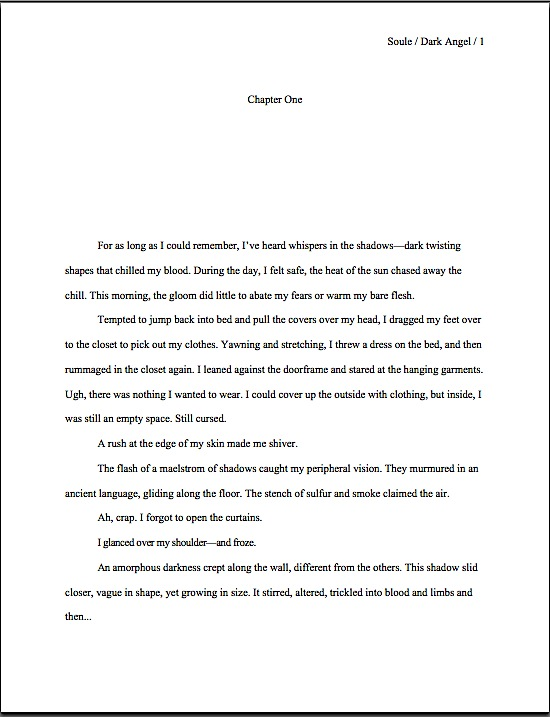
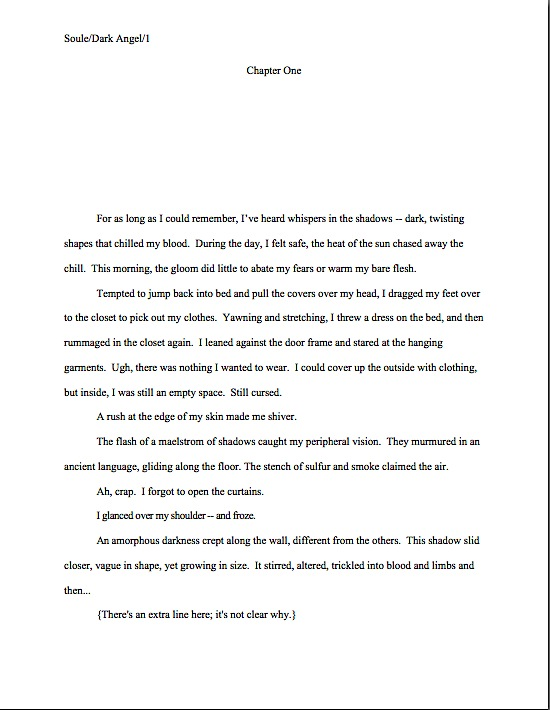
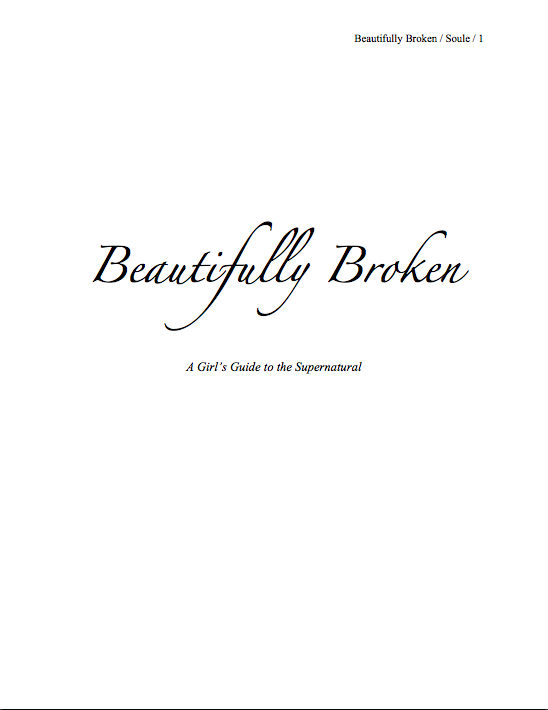
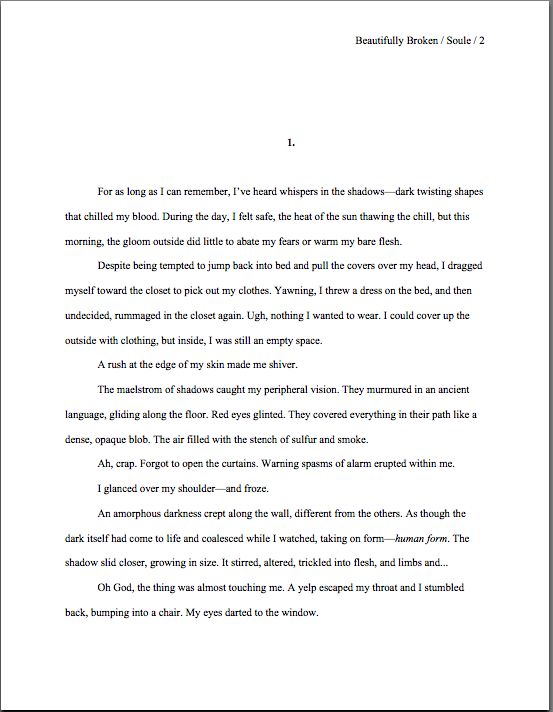
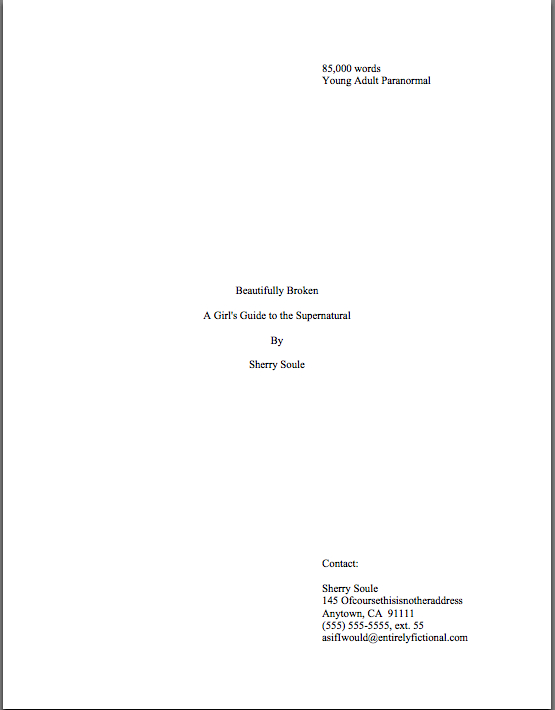
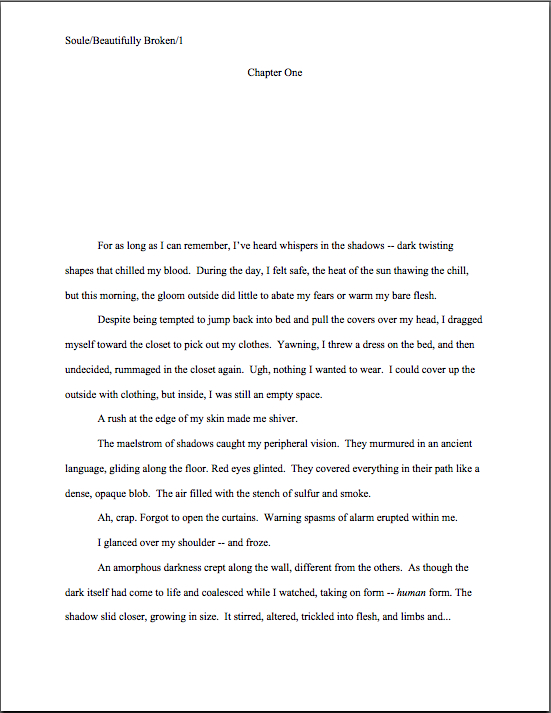
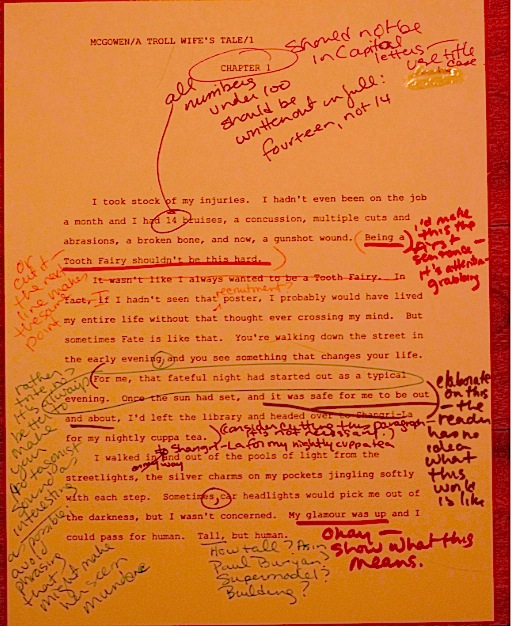
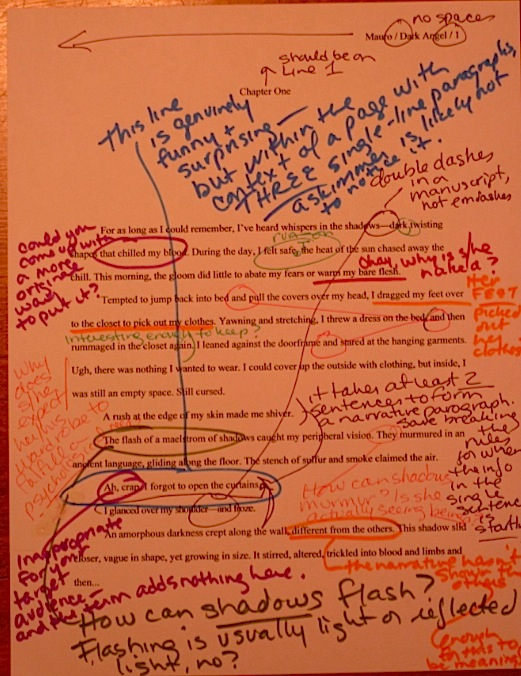

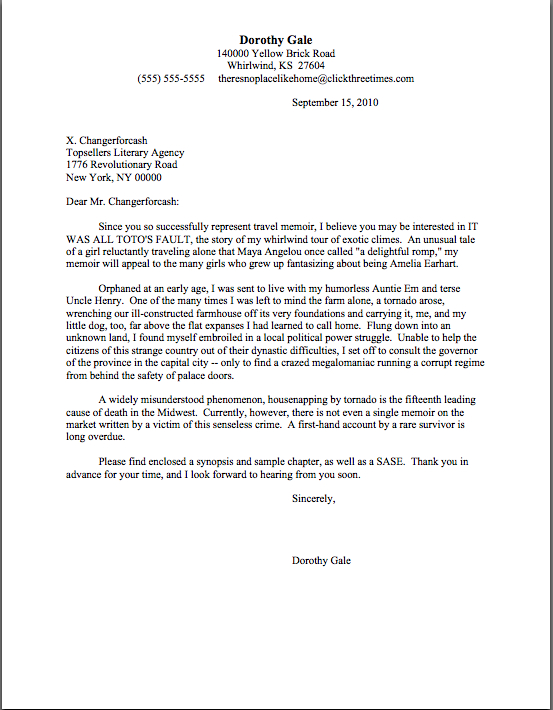
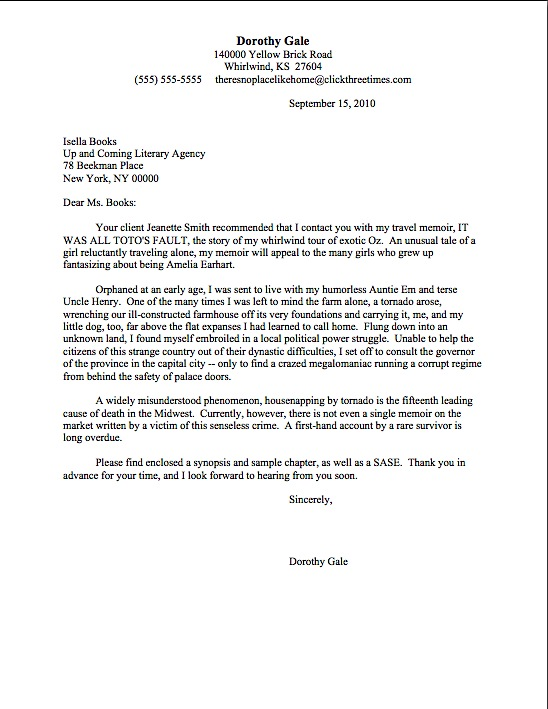
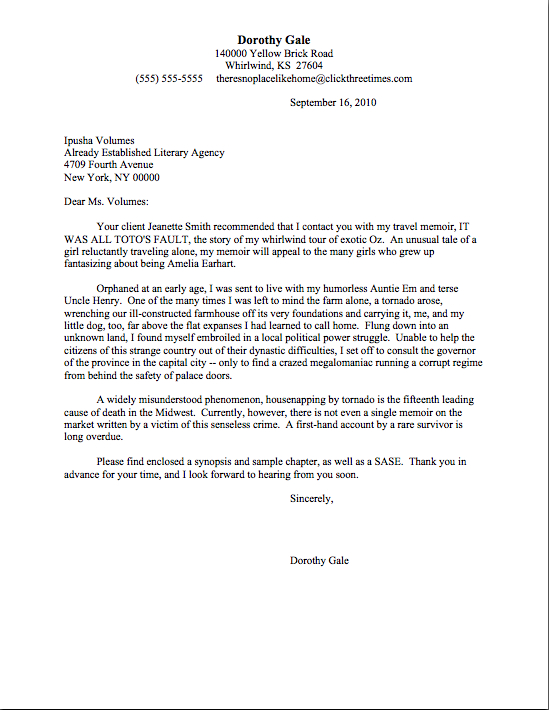
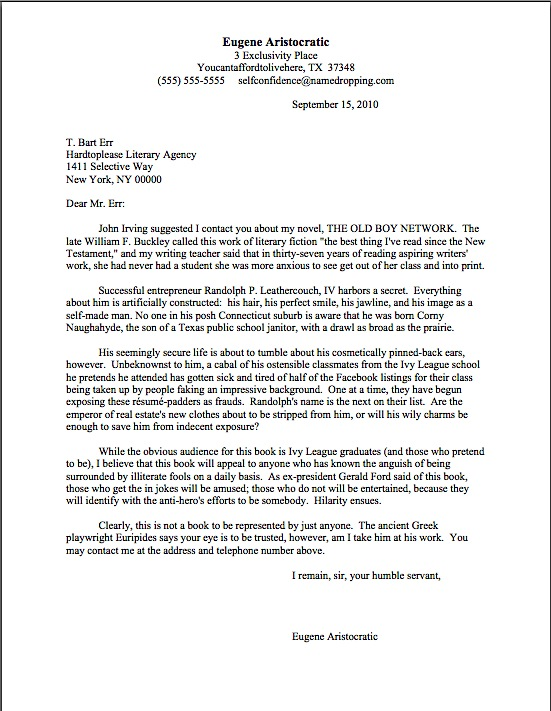
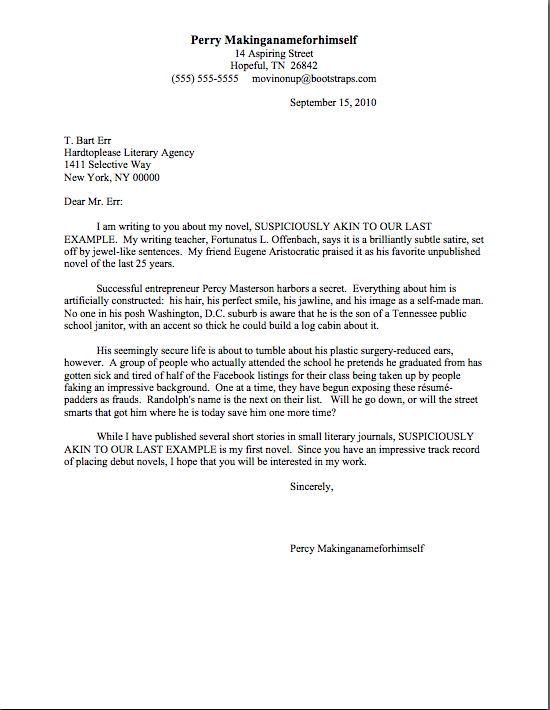

 No matter how many pages or extra materials you were asked to send, do remember to read your submission packet IN ITS ENTIRETY, IN HARD COPY, and OUT LOUD before you seal that envelope. Lest we forget, everything you send to an agency is a writing sample: impeccable grammar, punctuation, and printing, please.
No matter how many pages or extra materials you were asked to send, do remember to read your submission packet IN ITS ENTIRETY, IN HARD COPY, and OUT LOUD before you seal that envelope. Lest we forget, everything you send to an agency is a writing sample: impeccable grammar, punctuation, and printing, please.



